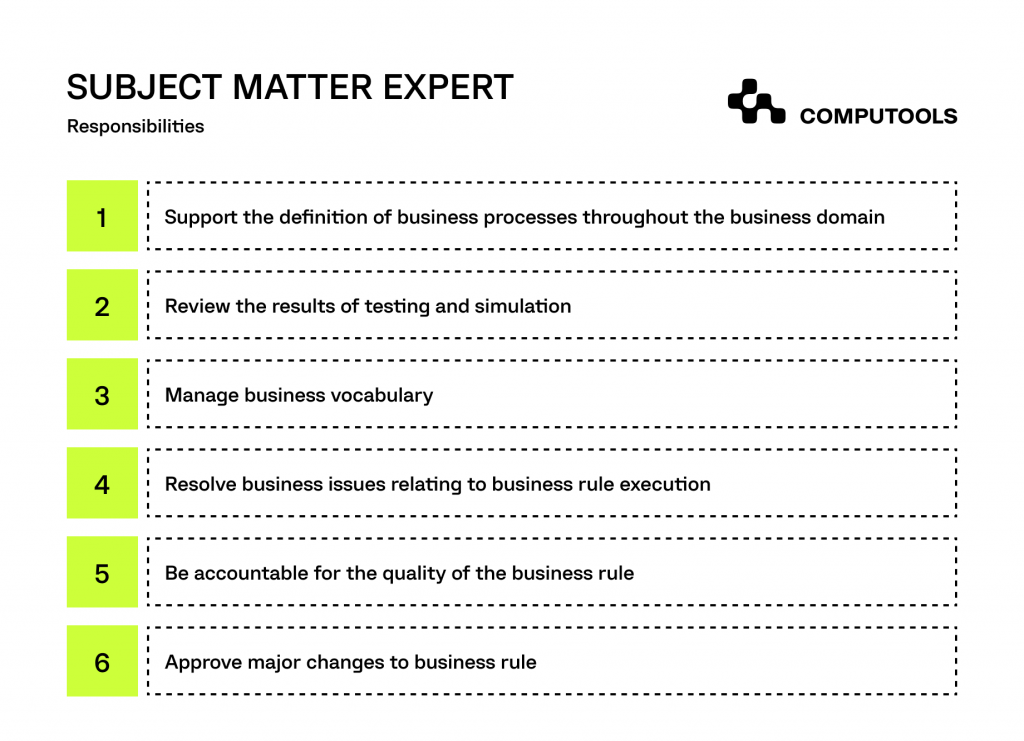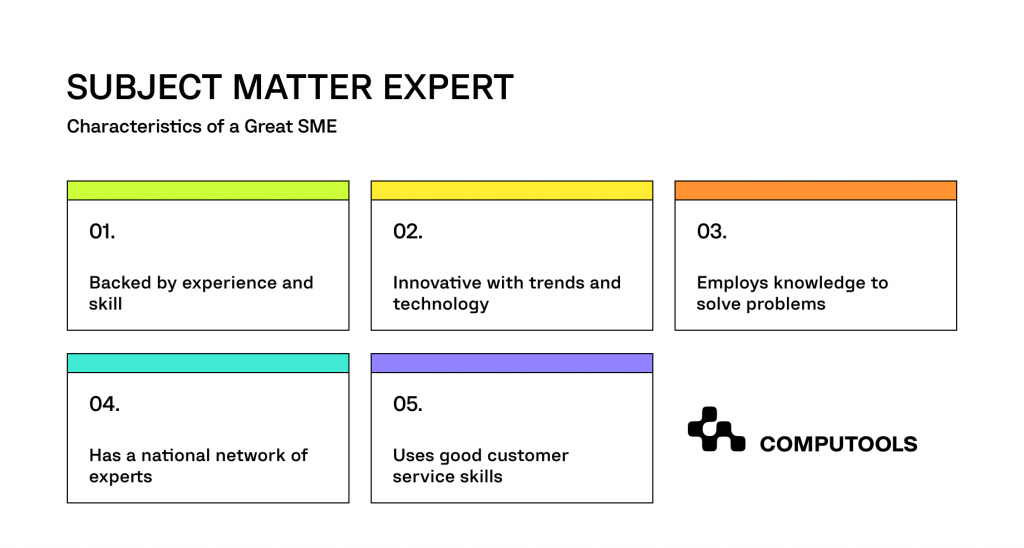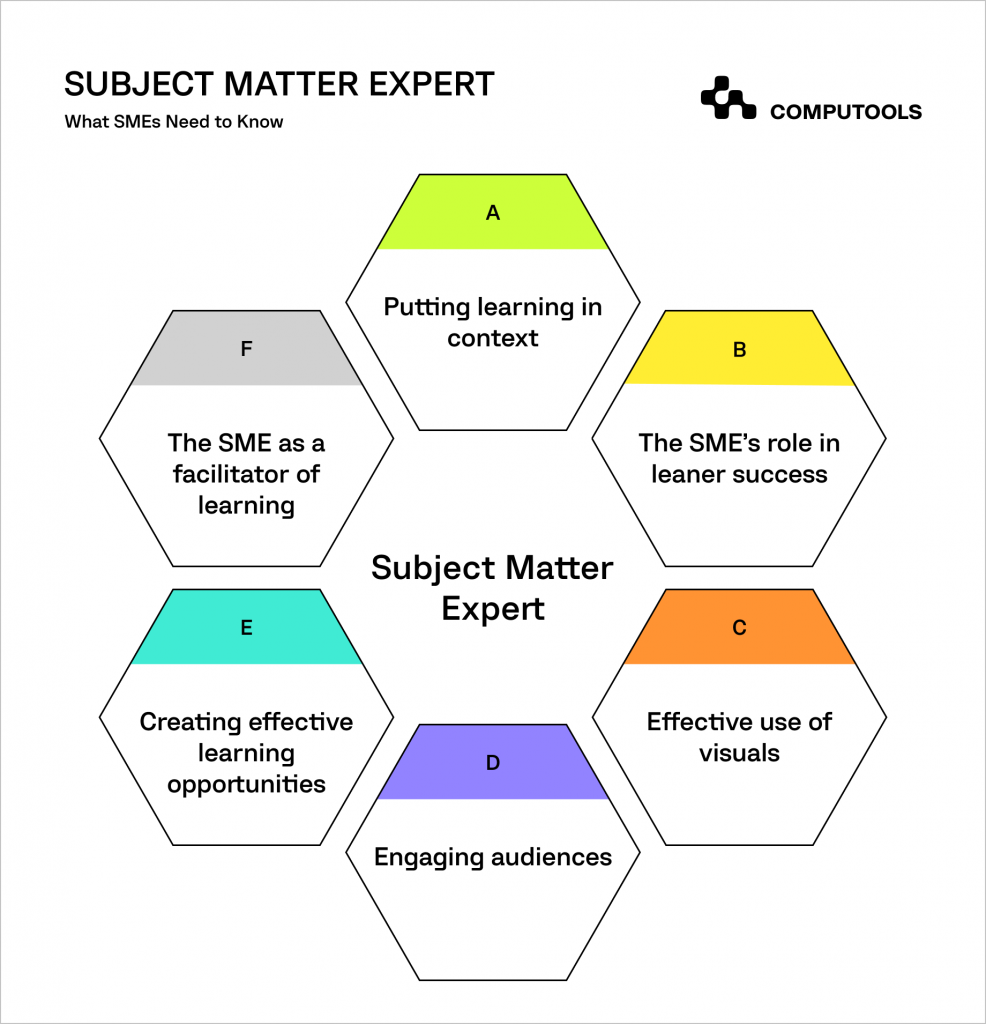Software development requires a subject matter expert (SME) or domain expert to ensure successful resolution of business problems for any commercial or internal software. The SME should be involved in the planning and analysis phase of the solution. Typically, this role is filled by someone on the client’s side, but the development team should also possess relevant domain expertise.
Even if the SME is not directly involved in planning, the service provider’s subject matter expertise is crucial in ensuring a comprehensive understanding of the potential system and minimizing the chances of building redundant or unnecessary software functionality. Therefore, it’s essential to consider having an SME on the development team. Forbes also emphasizes the importance of this role.
In this article, the idea of subject matter expertise in software development will be discussed and organized with links to validated resources and insight information from Computools’s IT professionals.
Subject Matter Expertise: Why Is It Important for a Project?
Having a subject matter expert (SME) involved in every stage of software development ensures that the solution is properly implemented. The SME’s role is to explain the business processes to the development team, including the transition from the current state to the desired state. This knowledge is critical in designing software that will effectively solve business problems and perform necessary functions. The SME’s expertise is also essential in addressing business constraints and creating an efficient system that avoids unnecessary features.
For instance, when planning a CRM system, the data import feature is typically a requirement, but other metrics and stages of the sales funnel may not be as clear. The client’s knowledge of their business and the development team’s understanding of the technology must be in sync for effective communication and a successful solution.

There are three main reasons why the SME’s expertise in subject matter is vital:
1. From the client’s perspective, having an experienced team that understands their business and can provide valuable recommendations is easier to work with.
2. From the development team’s perspective, having an SME helps address communication gaps and bottlenecks, facilitating a smooth and efficient implementation process.
3. From the engineer’s perspective, the SME’s expertise helps in building an interface that meets the client’s business needs while also considering the technical aspect.
Subject Matter Expert: Who Is It?
A Subject Matter Expert (SME) is not usually a formal position on a software development team. Instead, any professional on the client’s side with the necessary expertise about the system can perform the role of the SME depending on the project type.
The client-side representatives often have domain expertise and perform practical functions within the team, and their involvement in the development process can help minimize risks and simplify the product creation process. SMEs are crucial during system testing, as they are system validators, and their feedback is crucial.
There are three types of SMEs:
1. Product Managers on the client’s side, who understand the system’s functionality, its designation, and its output due to extensive domain expertise. They can act as SMEs during software development, for example, the head of the logistics department acting as the SME for the development of a CRM system for a logistics company.
2. CEOs/Startup founders who are well-versed in their domain expertise and business processes but require assistance in planning a custom software solution.
3. End-users, who are SMEs of the product in most cases, but their involvement in planning, developing, and testing a product is not always possible. In B2B scenarios, the Product Owner represents the interests of end-users and can describe the expected functionality clearly.
If the client doesn’t have an SME or similar roles in their team, the contractor should assume the role of the SME. In outsourcing, the project team usually includes the following professionals who proactively participate in all stages of the software development life cycle.

Sometimes a client may source an external consultant with domain expertise to assist the development team, but the team’s domain expertise is crucial to developing the proper solution that fulfills its business functions.
1. A Business Development Manager is responsible for identifying and pursuing new business opportunities to drive growth for a company. They research potential markets, analyze industry trends, and develop strategies to expand the company’s reach and revenue. They also build relationships with potential clients and partners, negotiate contracts, and collaborate with other departments to ensure successful implementation of new initiatives.
2. A Business Analyst is a professional who analyzes a company’s business processes, systems, and strategies to identify areas for improvement and recommend solutions to increase efficiency and productivity. They work closely with stakeholders to gather and document requirements, identify gaps, and propose solutions that align with business goals and objectives. The role of a business analyst is critical in helping organizations achieve their strategic objectives and maintain a competitive edge in the market.
3. A Designer Architect is a professional who specializes in designing the visual and functional aspects of software applications, including user interface (UI) and user experience (UX) design. They work closely with developers and other team members to ensure that the software architecture meets the client’s requirements and industry standards. Their goal is to create a user-friendly and aesthetically pleasing application that meets the needs of the client and end-users.
Expertise Collection: How the Process Goes?
During software development, SMEs are often not ready to share their expertise when meeting with the team. It has nothing to do with their intentions; instead, they often need additional coordination to understand what should be outlined to empower the software to be successful and functional. In this case, it’s the business analyst who must recognize how to collect all the necessary information from the SME, enabling smooth planning.
There are different ways to interact with the subject matter expert:
1. Interview. The most common way to collect domain expertise is to arrange a meeting and ask pre-prepared questions to the client. It’s recommended to ask open-ended questions that allow the expert to give a detailed answer and shed more information on the problem being solved.
For example, “How do you currently solve this business problem?” or “What product advantage will let you stand out against your competitors?” The interview secures an interactive discussion with stakeholders with necessary follow-up to clarify the details. Also, it encourages further engagement and facilitates relationship building.
2. Modeling. Due to a visual representation, it requires thorough preparation before meeting with an expert. As a rule, a consultant or analyst models a business process by presenting a diagram and drawing up a hypothesis. Then the analyst validates it during communication with an SME to clearly understand the system’s functionality, usually after many questions and clarifications.
3. Prototyping. In practice, exclusively one method of expertise collection is rarely used. Typically, analysts leverage several ways to understand a system entirely. Along with the interview, prototyping is often underestimated. Although it is a mandatory practice for Computools’s experts when creating a solution from scratch.
In this case, on the contractor’s side, a UX / UI designer also is engaged, in addition to the analyst, who creates a prototype of the future solution with the required level of detail. Speaking about the drawbacks of this method, stakeholders often focus on the design specifications rather than the requirements that any solution must address.
4. Focus Group. This method of collecting expertise is appropriate for large-sized projects with many stakeholders, who often serve as SMEs, engaged. It also requires the moderator to guide the conversation, ask the right questions and record valuable information affecting the future solution’s scope and characteristics. Being under development, the product discussion is required to update the existing or new requirements. If a product is ready for launch, the discussion will be on releasing the product.

Why Computools Is an Expert in Business/B2B Solution Development?
Computools is a full-service software company that designs efficient software solutions to help companies meet the needs of tomorrow. With extensive expertise and proven success in consulting services, Computools provides a broad portfolio of products and solutions in various industries that help grow your business at a faster pace enabling smooth and efficient operations.
Computools’s IT experts consistently keep abreast of each industry’s trends and standards, enabling them to advise clients more efficiently while integrating optimal technical solutions.
Having years in Research and Development activities, our team is constantly engaged in software development from scratch by creating new technologies, products, services, and systems. That’s why our software engineers complete any project faster, ensuring the ultimate outcome.
It’s high time to invest in subject matter expertise! Schedule a consultation with Computools’s experts at info@computools.com to drive innovation together.
Computools
Software Solutions
Computools is an IT consulting and software development company that delivers innovative solutions to help businesses unlock tomorrow.









“Computools was selected through an RFP process. They were shortlisted and selected from between 5 other suppliers. Computools has worked thoroughly and timely to solve all security issues and launch as agreed. Their expertise is impressive.”